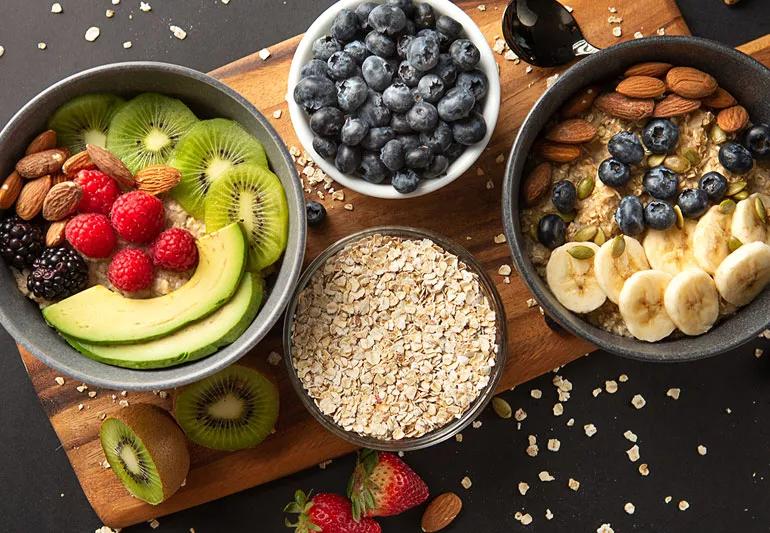It’s all about choosing complex carbs — like whole grains — that will keep you full

Image content: This image is available to view online.
View image online (https://assets.clevelandclinic.org/transform/c083a215-4a3d-48ad-abdf-ee213973ff28/oatmeal-Fruit-Nuts-carbohydrates-1402281575-770x533-1_jpg)
Carbohydrate food including oats, fruits and nuts all combined into a healthy breakfast.
You’ve probably heard many times throughout your life that carbohydrates (or carbs) are the enemy — especially if you’re trying to lose weight.
Advertisement
Cleveland Clinic is a non-profit academic medical center. Advertising on our site helps support our mission. We do not endorse non-Cleveland Clinic products or services. Policy
But it’s not that simple, says registered dietitian Anna Taylor, RD, LD. “Not all carbs are created equal.”
Carbs can provide energy, protect against disease and actually help control your body weight. It’s all about the types of carbs you choose. And there’s two different types of carbs:
And if you eat the right mix of healthy carbs while following a high-carb diet, you may reap some benefits like weight loss and a decrease in inflammation.
Taylor breaks down the pros and cons of eating a high-carb diet.
Taylor says there’s no official definition of a high-carb diet, but offers this guidance:
“In general, in the United States, we recommend that about 45% to 65% of your total calories come from carbohydrates,” she explains. “So, a high-carb diet would be at the upper end of that range or may include more than two-thirds of your total calories coming from carbs.”
Advertisement
And you may have heard that the Mediterranean diet or the DASH diet may be considered a high-carb way of eating.
“The Mediterranean diet and the DASH diet are styles or patterns of eating that focus on foods that you eat more often and less frequently — not necessarily the exact proportions or ratios of these foods,” clarifies Taylor. “But many people who follow the Mediterranean diet or the DASH diet may end up with a higher amount of carbohydrate intake. And that’s because you’re eating healthy fiber-rich plant foods that are mostly carbohydrates, like whole grains, fruits, vegetables and legumes.”
The answer isn’t so simple, reiterates Taylor. But what does the research say?
A 2015 study shows that a high-carbohydrate diet affected the body composition in young men and resulted in a significant increase in total body weight and BMI (body mass index).
But a 2018 study of people considered having overweight shows that a plant-based high-carb, low-fat diet has beneficial effects on weight and body composition.
“And a 2018 systematic review and meta-analysis, which looks at all available information, says that it cannot conclude that a high-carb diet increases the odds of obesity,” adds Taylor. “That’s because not all carbs are created equal. In other words, it’s not necessarily about the percentage of carbs that we’re eating, it’s about what kind of foods we’re choosing.”
Think about it:
“Since these higher fiber foods are more filling, Person B may lose some weight over time,” notes Taylor. “So, although on paper, these people both are on high-carb diets, the application is completely different and you get different results. That’s the crux of the issue with carbs.”
Eating a minimally processed high-carb diet does have some benefits — but remember, it’s all about the types of carbs you choose.
Benefits may include:
“Fiber-rich carbohydrates can also support a healthy digestive system,” says Taylor.
The key is eating the right kind of carbohydrates. Taylor says these are the types of healthy carbs you want to work into your meals:
Advertisement
“Fiber is only found naturally in plant foods, so the less processed these plant foods are, the more fiber they typically contain,” explains Taylor. “So, eating lots of food that grow out of the ground and haven’t spent too much time in a factory since then is key to following a high-carb diet with these types of health benefits.”
If you’re not choosing the right kind of carbs, a high-carb diet full of processed refined grains and simple sugars can wreak havoc on your diet.
“Those types of foods — though high-carb — aren’t going to be satisfying and you’re going to constantly be craving sugar. And the reason is because every time you eat fast-acting carbs, your insulin response promotes hunger and your blood sugar skyrockets,” stresses Taylor.
“And you’re missing out on all the foods that help protect you from disease, while eating foods that can contribute to risk for diseases or worsen preexisting conditions.”
Advertisement
Taylor understands that carbs have a bad reputation, but clarifies that if you choose smartly, the carbs you eat — again, think whole grains, fruits and vegetables — can be a vital part of your health and wellness goals.
“What we want to focus on is how can we make the foundation of your diet foods that matter and foods that you can live with,” she says. “I think that people get so caught up in counting carbs or counting calories that they’re missing the forest of the trees. They’re not filling up on foods that enhance their health and make them feel good.”
Advertisement

Sign up for our Health Essentials emails for expert guidance on nutrition, fitness, sleep, skin care and more.
Learn more about our editorial process.
Advertisement
Whole-food carbs come with major health benefits, like fiber and antioxidants
Nutrition labels explain a product’s calories, fat content, nutrients, vitamins and more
The amount you need depends on several factors, such as age, sex and activity level
These essential elements from fats, protein, carbs, vitamins and minerals help your body function properly
Here’s why you crave them and how to curb them
The eating plan is ideal for fueling high-intensity activities (but not for weight loss)
Opt for complex carbs that are full of fiber or protein
Why a clean diet is so important
Type 2 diabetes isn’t inevitable with these dietary changes
Applying a hot or cold compress can help with pain
Pump up your iron intake with foods like tuna, tofu and turkey